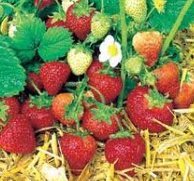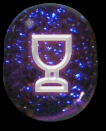Strawberry
"Strawberry" is from the Anglo-Saxon Strowberige, of which the first syllable refers to anything strewn. The wild woodland Strawberry (Fragaria vesca) is the progenitor of our highly cultivated and delicious fruit. This little hedgerow and sylvan plant has a root which is very astringent, so that when held in the mouth it will stay any flow of blood from the nostrils.
Added Dec 16, 2010
| 7,507 Reads
Properly, our familiar Strawberry plant is a native of cold climates, and so hardy that it bears fruit freely in Lapland. When mixed with reindeer cream, and dried in the form of a sausage, this constitutes Kappatialmas, the plum pudding of the Polar regions. "Strawberry" is from the Anglo-Saxon Strowberige, of which the first syllable refers to anything strewn. The wild woodland Strawberry (Fragaria vesca) is the progenitor of our highly cultivated and delicious fruit. This little hedgerow and sylvan plant has a root which is very astringent, so that when held in the mouth it will stay any flow of blood from the nostrils. Its berries are more acid than the garden Strawberry, and make an excellent cleanser of the teeth, the acid juice dissolving incrustations of tartar without injuring the enamel. A medicinal tincture is ordered (H.) from the berries of this Woodland Strawberry, which is of excellent service for nettle rash, or allied erysipelas: also for a suffocative swelling of the swallowing throat. "Ipsa tuis manibus sylvestri nata sub umbrâa: mollia fraga leges," says Ovid. An infusion of the leaves is of excellent service in Dysentery. It is incorrect to call the fruit a berry, because the edible, succulent pulp is really a juicy cushion over which numerous small seeds are plentifully dotted; whilst the name Strawberry is a corruption of Strayberry, in allusion to the trailing runners, which stray in all directions from the parent stock. Being of very ancient date, the Strawberry is found widely diffused throughout most parts of the world. Among the Greeks its name Komaros, "a mouthful," indicated the compact size of the fruit. By the Latins it was termed Fragaria, because of its delicate perfume. Virgil ranked it with sweet-smelling flowers; Ovid gave it a tender epithet; Pliny mentions the Strawberry as one of the native fruits of Italy; Linnaeus declared he kept himself free from gout by eating plentifully of the fruit; and Hoffman says he has known consumption cured by the same means. From Shakespeare we learn that in his day the fruit was grown in Holborn, now the centre of London. Gloster, when contemplating the death of Hastings, wishes to get the Bishop of Ely temporarily out of the way, and thus addresses him:-- "My Lord of Ely--when I was last in Holborn I saw good Strawberries in your garden there; I do beseech you send for some of them." In Elizabeth's time doctors made a tea from the leaves to act on the kidneys, and used the roots as astringent. All former Herbalists agreed in pronouncing strawberries wholesome and beneficial beyond every other English fruit. Their smell is refreshing to the spirits; they abate fever, promote urine, and are gently laxative. The leaves may be used in gargles for quinsies and sore mouths, but, "if anyone suffering from a wound in the head should partake of this fruit, it would certainly prove fatal," in accordance with a widespread superstition. So wholesome are Strawberries, that if laid in a heap and left by themselves to decompose, they will decay without undergoing any acetous fermentation; nor can their kindly temperature be soured even by exposure to the acids of the stomach. They are constituted entirely of soluble matter, and leave no residuum to hinder digestion. It is probably for this reason, and because the fruit does not contain any actual nutriment as food, that a custom has arisen of combining rich clotted cream with it at table, whilst at the same time the sharp juices are thus agreeably modified. "Mella que erunt epulis, et lacte fluentia fraga":-- "Then sit on a cushion, and sew up a seam; And thou shalt have Strawberries, sugar, and cream." Cardinal Wolsey regaled off this delicate confection with the Lords of the Star Chamber; and Charles Lamb is reported to have said, "Doubtless, God Almighty could have made a better berry, but He never did." Parkinson advised that water distilled from strawberries is good for perturbation of the spirits, and maketh the heart merry. The fruit especially suits persons of a bilious temperament, being "a surprising remedy for the jaundice of children, and particularly helping the liver of pot companions, wetters, and drammers." "Some also do use thereof to make a water for hot inflammations in the eyes, and to take away any film that beginneth to grow over them. Into a closed glass vessel they put so many strawberries as they think meet for their purpose, and let this be set in a bed of hot horse manure for twelve or fourteen days, being afterwards distilled carefully, and the water kept for use." The chemical constituents of the Strawberry are--a peculiar volatile aroma, sugar, mucilage, pectin, citric and malic acids in equal parts, woody fibre, and water. The fruit is mucilaginous, somewhat tart and saccharine. It stimulates perspiration, and imparts a violet scent to the urine. When fermented for the purpose it yields an ardent spirit. If beaten into a pulp when ripe, and with water poured thereupon, it makes a capital cooling drink which is purifying, and somewhat laxative. Strawberries are especially suitable in inflammatory and putrid fevers, and for catarrhal sore throats. French herbalists direct that when fresh, and recently crushed, the fruit shall be applied on the face at night for heat spots and freckles by the sun. From the juice, with lemon, sugar, and water, they concoct a most agreeable drink, Bavaroise à la grecque; also they employ the roots and leaves against passive hemorrhages, and in chronic diarrhoea. In Germany, stewed strawberries, and strawberry jam are taken at dinner with roasted meats, or with chicken. This jam promotes a free flow of urine. It is to be noticed that though most commonly wholesome and refreshing, yet with some persons, particularly those of a strumous bodily habit, Strawberries will often disagree. The late Dr. Armstrong held a very strong opinion that the seed grains which lie sprinkled allover the outer surface of each pulpy berry are prone to excite much intestinal irritation, and he advised his patients to suck their Strawberries through muslin, in order to prevent these diminutive seeds from being swallowed. German legends dedicate Strawberries to the Virgin, with whom they are reputed to have been a favourite fruit. She went a berrying with the children on St. John's morning; and therefore no mother who has lost a young child, will taste the delicacy then. The Strawberries symbolise little children who have died when young, and the mothers suppose they ascend to heaven concealed in the fragrant pulp. From the French, fraise, signifying the Strawberry leaves borne on the family shield, is derived in Scotland the name of the Frazers. And eight of these leaves wrought in ornamental gold form a part of the coronet which our English dukes claim as one of their proud insignia, conferred by Henry the Fourth. Being desirous of adding fresh splendour to the Coronation of a Lancastrian Prince he introduced these leaves into the regal Crown. An earl's coronet has eight leaves: that of a marquis four.
Added Dec 16, 2010
| 7,507 Reads
Share The Magic ...
The GoE MONEY!!! Course - A Course In Real MONEY MAGIC!
|





















